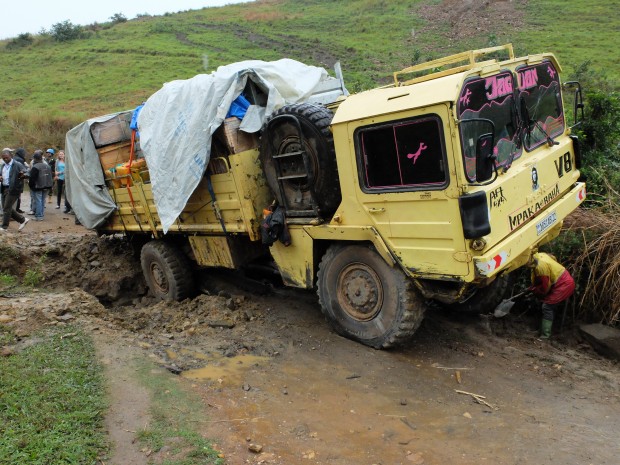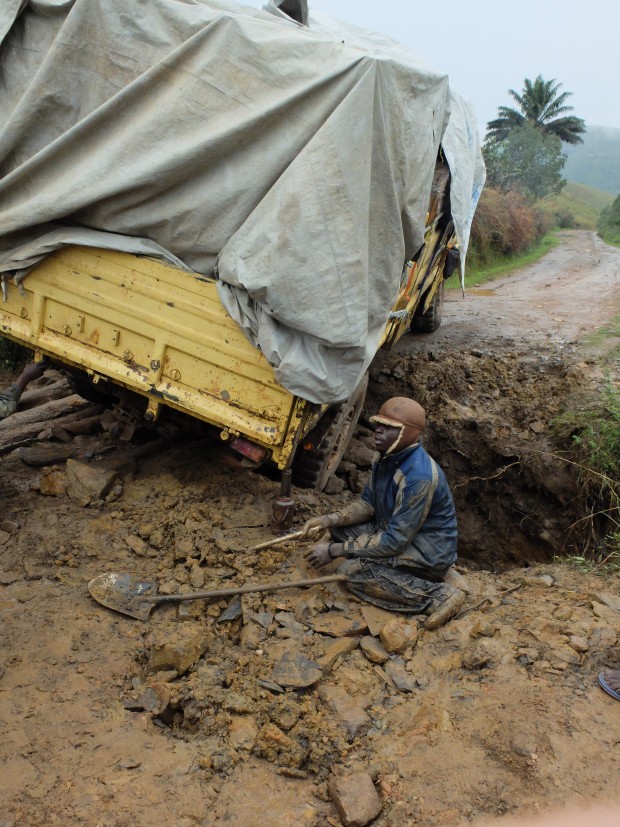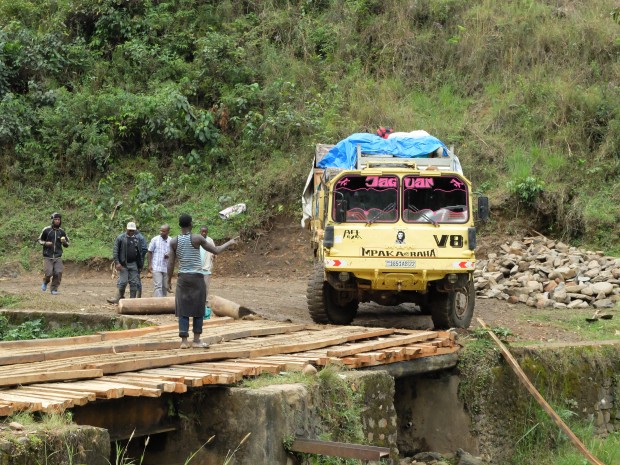It had rained solidly all night, and was still raining at 6:30 as we assembled at the Pakistani Company Operating Base outside Walungu to assess whether the road trip was possible. The Burhale to Shabunda road in South Kivu is a strategic route over rough terrain, through rain forest to the mineral rich area of Shabunda. The road has been impassable for close to 20 years, with all goods having to be flown into Shabunda – pushing prices up ten-fold. Where the road ends the Mai-Mai begins – with areas along the route controlled by the Raia Mutomboki. Without a road it is difficult to provide security, connect the people with the state, and bring basic services. For almost three years now, DFID DRC has been working to rehabilitate the road. I was back in Burhale to drive as far down the road as possible – repeating a trip I made when I first arrived in the DRC almost four years ago.
With the rain still falling, we set off with our UNOPS implementing partners and with representatives from the Congolese authorities with responsibility for the road. The rain had turned the clay surface into greasy mud, and as the treads on our tyres became clogged, our 4X4s took on the characteristics of an over-loaded snowboard, with the back end threatening to overtake the front at any moment, as we snaked down inclines with steep drops to either side. It was almost as disconcerting to be passed, on a number of occasions, by battered and overloaded Toyota Corolla taxis, taking people and goods to market.

About an hour and a half into the trip, and having covered about 15km, we were confronted by a huge yellow 4X4 Man truck carrying the antenna and equipment for a new telephone relay station. The lorry was crossing a log culvert, and its rear wheels had slipped off, leaving the lorry stranded and totally blocking the road. My initial assumption was that it would take weeks to clear, requiring heavy lifting equipment that would have to be sent from Bukavu. But, under the guidance and instruction of the lorry driver, a team of about 10 young Congolese men set about raising the lorry with two jacks, balancing the rear wheels precariously on rocks, then using the jack to push the lorry back onto the logs, and then with a tow from another lorry, the wagon was extracted from the culvert, and free to proceed.

This two and a half hour lesson in the resilience and ingenuity of Congolese workers also reveals some of the challenges DFID DRC has confronted in trying to rehabilitate this road. We had set the specifications for the road to allow the passage of 4X4 vehicles with a weight restriction of 5 tonnes. However, in the absence of any local authority to police the weight limit, vehicles of much greater weight – such as this truck – are free to pass down the road, doing structural damage and risking the permanent closure of the road. Our approach had been that, once the road had been rehabilitated, maintenance would be the responsibility of the Congolese authorities. However, all tolls collected on the road are sent back to Kinshasa where decisions on which roads to maintain are made. Not enough money then filters back down to the local level, with the result that insufficient maintenance is being done on the road. The central section of the road through the forest has, as a result of security restrictions, disappeared. This is no longer a rehabilitation job, but full construction. To do this will require heavy plant and machinery to be brought in – all of which requires the culverts and bridges to bear a weight of over 30 tonnes.
Carefully designed programmes that balance development impact and value for money can be undone by the harsh realities on the ground. The Democratic Republic of the Congo is not an easy place to make development progress.

Keep in touch. Sign up for email updates from this blog, or follow Chris on Twitter.

Recent Comments